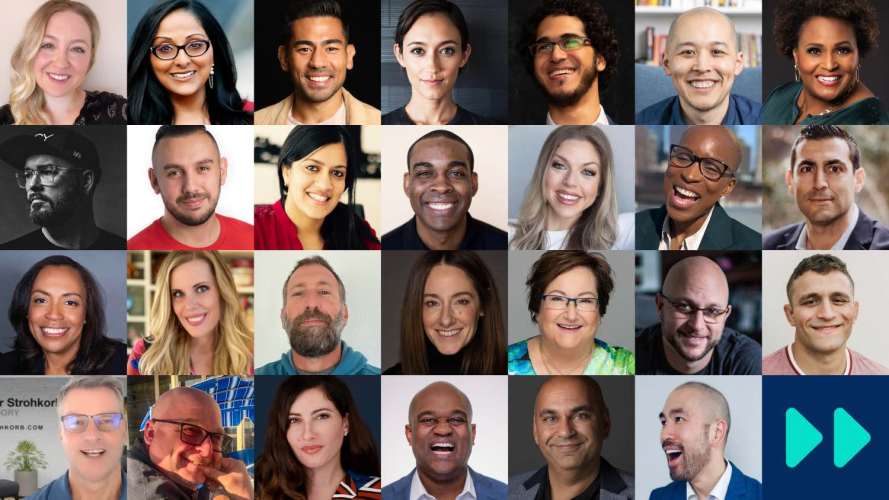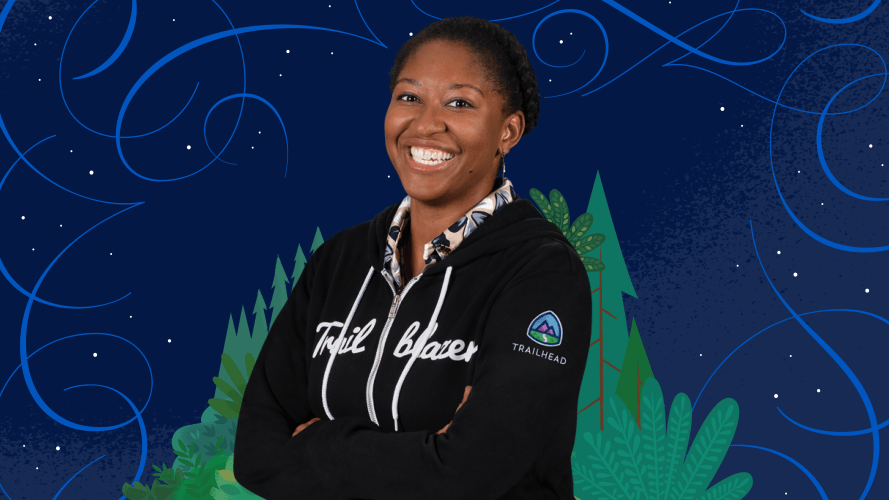Reflecting on the 57th Anniversary of the March on Washington and How To Carry the Legacy Forward
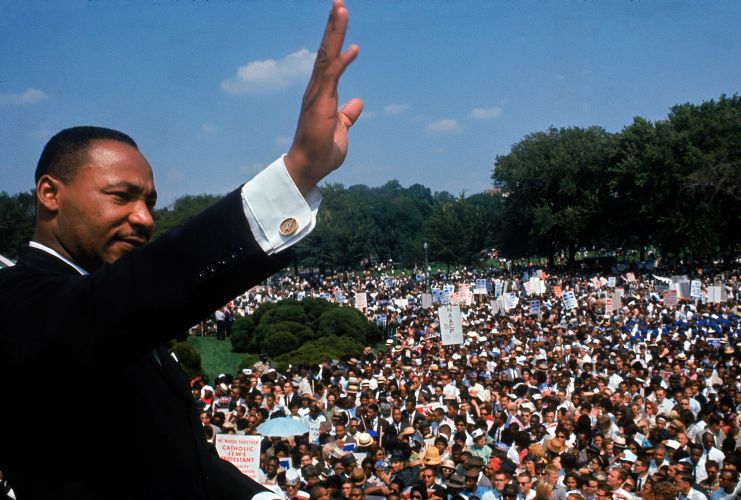


Today, we are reminded of the legacy of the March on Washington, and more urgently, the work that remains to be done to reach lasting racial equality.

Monica Bowie
Fifty-seven years ago, nearly a quarter million people of all identities came together in the nation’s capital to march for civil rights, equal opportunities, justice, and freedom for the Black community. It was during this historic March on Washington — also called the March for Jobs and Freedom — that Dr. Martin Luther King, Jr. delivered his “I Have a Dream Speech” which gave us hope, a vision for the future, and a call for change.
Today, we are reminded of the legacy he left us with, and more urgently, the work needed to be done to reach lasting racial equality. We are still confronted with persistent violence and hate against our community, unimaginable injustices, and equality gaps across our society. As this generation cries “Black lives matter” and we seek justice for George Floyd, Breonna Taylor, Ahmaud Arbery, and Jacob Blake, our history helps guide and inspire us to keep moving forward.
As a Black woman, the global president of BOLDforce (our Black ERG at Salesforce), and someone who grew up in Birmingham, Alabama — which was at the heart of the civil rights movement — the weight of this current climate is even heavier.
I grew up listening to my grandmother tell stories of protesters being attacked by police dogs, police spraying these same protesters with water hoses, and all of the suffering at the hands of racism. These disturbing images are similar to what we see on viral videos on an almost weekly basis. My first visit to the Birmingham Civil Rights Institute was on a middle school field trip. What I saw and read there made a profound impact on my life, serving as a foundation on which I built a commitment to champion equal rights and access for the Black community and for anyone that’s underrepresented. I will always remember the words from Dr. King’s famous Letter From a Birmingham Jail where he reminded the world “injustice anywhere is a threat to justice everywhere.”
When I think about this year’s anniversary of the March on Washington, I imagine what Dr. King would say if we could have a conversation with him in 2020. Would he be proud, would he feel we have come a long way but still have a long way to go? To explore that answer we can only turn to his words in his letters, in his speeches, and spoken on that day in Washington 57 years ago, as we work to live up to his call for “direct action” and change. On this anniversary, thousands of people return to the site of this historical moment. The 2020 March on Washington will be live-streamed by the NAACP with the theme — “Get Your Knee Off Our Necks” — inspired by a refrain from Rev. Al Sharpton’s eulogy for George Floyd. Let’s all tune in to reflect and honor the legacy.
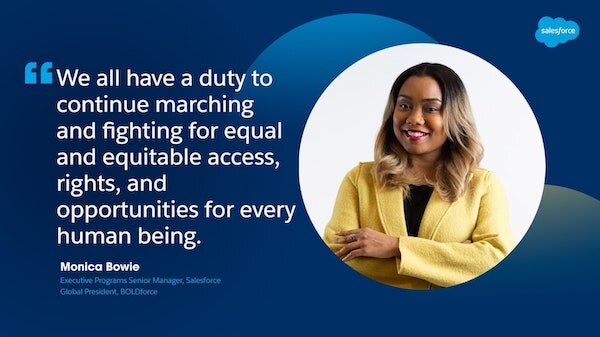
We must acknowledge that this current moment in history has stirred up many emotions. There is an opportunity to channel those emotions into the direct action encouraged by Dr. King.
For this inflection point in time, here are three things you can do to commemorate and honor this year’s anniversary of the March on Washington:
- Vote. This human right is one that Black Americans didn’t have until 1965. It was actually many voting rights marches in Alabama that led to Congress passing the Voting Rights Act. Please don’t take this as a luxury or choice. Consider this a privilege that many have marched and fought for. Even today, voter suppression is still very prominent. Don’t take this moment for granted. You must vote, and rally others to vote as well.
- Use your platform and time responsibly. We all have a role to play. People of faith refer to these roles as analogous to “the body” and each of us has an important task to make sure the body operates effectively. The larger your platform, the greater responsibility, and accountability for your role in providing equity and access for others. No race is a monolith, so don’t get distracted with how your peers may use their platform, or if everyone is doing the same thing. Do your part. If you lead an organization, lead a team, are an individual contributor, or a parent, you have a part to play. If you are a member of the body, are you a lung, an arm, or an ear? Make sure you operate your part as a lung to breathe life into others, use your part as an arm to pull up seats and give access to others, and use your part as an ear to listen actively, with empathy on the experiences of others. Here are eight ways to stand in support of the Black community.
- Do your work. Lead with empathy. When you show up from a place of understanding the perspective of another human being, you are equipped to make meaningful change. I encourage you to read the “Letter from a Birmingham Jail,” and to watch the “I Have a Dream” speech. Both will inspire you and ignite a sense of true empathy for this moment in time. While we are all on a journey to become more aware and practice active allyship and use our platforms for change, don’t forget to do your work! The very personal self-awareness that is required to build a more equitable and inclusive world will demand you expand your mindset, beliefs, challenge your comfort zone, and grow into a more empathetic individual. We are all on a journey, doing our work.
Below are some reflections some of my colleagues and leaders at Salesforce shared on the significance of the March on Washington:
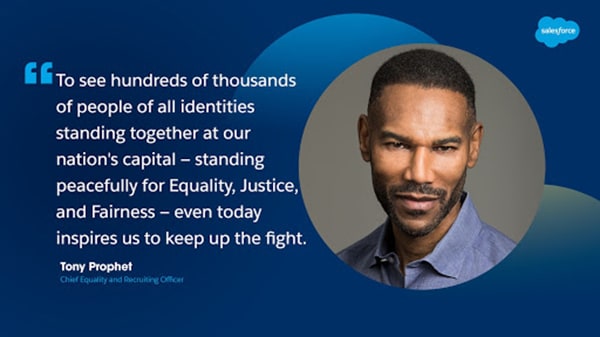
“Every movement has a turning point, an inflection point, a moment when folks rise up and stand. The March on Washington was a watershed moment in the fight for Civil Rights in America. To see hundreds of thousands of people of all identities standing together at our nation’s capital standing peacefully for Equality, Justice, and Fairness — even today inspires us to keep up the fight. And while we’ve made some progress there is much work ahead — rise up, stand up, speak up. History is watching and the moment is now.” , Chief Equality and Recruiting Officer.
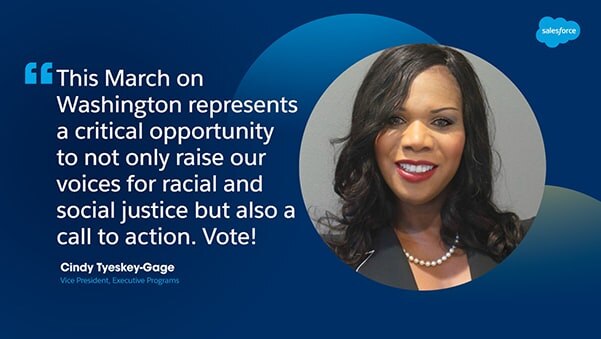
“This is a movement and now is not the time to be silent. There is an urgency in this moment with a consequential presidential election in the balance. This March on Washington represents a critical opportunity to not only raise our voices for racial and social justice but also a call to action. Vote! I’m inspired by what Dr. King said, “We hold these truths to be self-evident, that all men and women are created equal,” said , Vice President, Executive Programs.
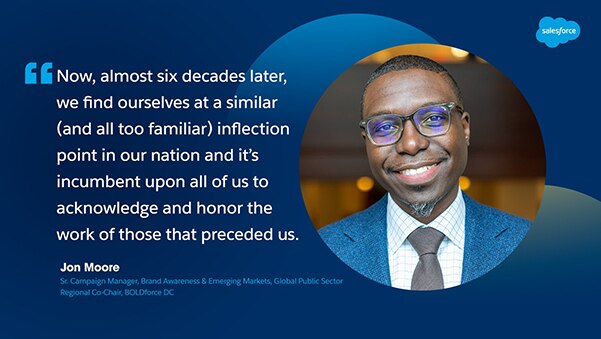
“Now, almost six decades later, we find ourselves at a similar (and all too familiar) inflection point in our nation and it’s incumbent upon all of us to acknowledge and honor the work of those that preceded us by affirming our responsibility to carry that work forward.
Whether we show up physically or show our collective solidarity in virtual spaces, our commitment to change must remain consistent. This year’s march marks an opportunity for us to not only collectively mobilize resources but to do so in an inclusive way. That, I hope, makes an intentional effort to foreground the voices of oft-overlooked populations — particularly Black and Indigenous women and LGBTQIA+ people of color. [Groups] that are not only disproportionately affected by the inequities that we are collectively rallying against but, in honesty, are still largely marginalized even in the context of the current movement.
The call for accountability, justice, and freedom in this country is just as clear — and relevant — today as it has been since 1619 and until we establish policies and create a culture that safeguards & celebrates the humanity of all, the fight for true equality will persist,” said Jon Moore, Sr. Campaign Manager Brand Awareness and Emerging Markets, Global Public Sector and Regional Co-Chair of BOLDforce DC.
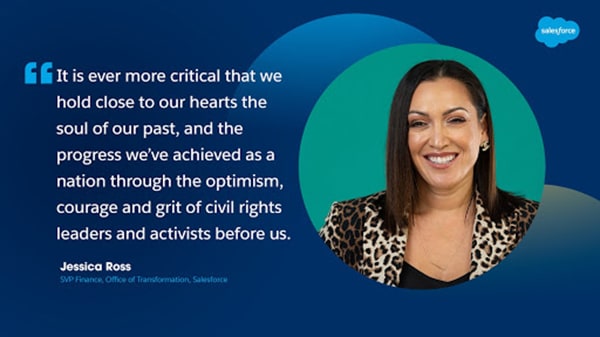
“As we stand in the face of a revolutionary moment for America, it is ever more critical that we hold close to our hearts the soul of our past, and the progress we’ve achieved as a nation through the optimism, courage, and grit of civil rights leaders and activists before us. As we approach the 57th anniversary of the historic March on Washington, I can think of no better moment to come together to reflect and recommit to action as we think forward to the legacy we want to leave for our children and the generations to come,” said Jessica Ross, Senior Vice President Finance, Office of Transformation.
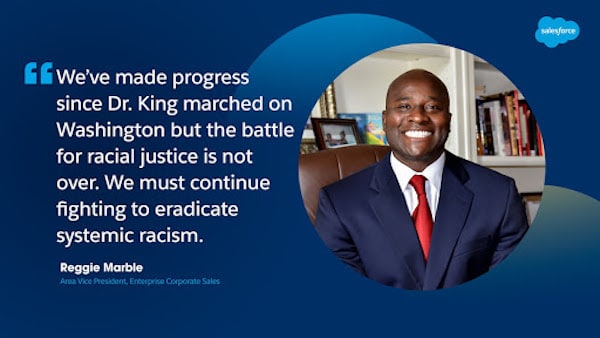
“We’ve made progress since Dr. King marched on Washington but the battle for racial justice is not over. We must continue fighting to eradicate systemic racism. We all have a role in reaching true equality for all,” said Reggie Marble, Area Vice President, Enterprise Corporate Sales.












